#complex systems
Text

Plato, Phaedrus, 265D[-E], in Christopher Alexander, Notes on the Synthesis of Form, Harvard University Press, Cambridge, MA, 1964
«First, the taking in of scattered particulars under one Idea, so that everyone understands what is being talked about… Second, the separation of the Idea into parts, by dividing it at the joints, as nature directs, not breaking any limb in half as a bad carver might.»
– Plato, Phaedrus, 265D[-E]
#graphic design#architecture#urbanism#mathematics#set theory#graph theory#complex systems#complexity theory#methodology#notes on the synthesis of form#book#christopher alexander#platone#plato#pattern language#harvard university press#1960s
15 notes
·
View notes
Text
Data Prep Day!
Finally fully back at work and in R/RStudio today. Today's goal was to set up some basic structural topic models using a dataframe of information about PubMed publications on post-acute COVID-19 sequalae.
No exciting results today, but if you're interested in topic modeling or wrangling data in R, I made a video so you can follow along with me while I code. Not a formal lesson, more of a "come to work with me" thing. Enjoy!
Highlights:
Full Video:
youtube
#come to work with me#postdoc life#postdoctoral research#public health#complex systems#pubmed#text as data#R#R studio#coding#data science#learn to code#code with me#research#academic research#science#phdblr#gradblr#studyblr#scienceblr#long covid#covid#covid research#Youtube
3 notes
·
View notes
Text
Hacking the Game
While there is absolutely nothing wrong with running a game entirely according to the rules as presented in the book, most Game Masters I have encountered in life tend to have their own House Rules. After all, running a game comes with a certain amount of game design inherently built into the experience. I know some might disagree with this assertion, but I believe this to be true, starting when you craft encounters while agonizing over whether or not you believe your party of player characters can rise to the challenge and then eventually expanding as you begin to craft unique magic items or monsters specific to your campaign.
Why then shouldn't a Game Master eventually start tinkering around with the very rules that underpin the entire system in order to meet their specific needs? With the agreement of your Players, of course.
Success at a Cost
Not so much a house rule of my own design in this case, but rather an optional rule presented within the text of Fabula Ultima itself, well... I let the text box speak for itself:

I like this rule a lot because it gives the players the opportunity to turn those agonizing near misses, when you just miss the check difficulty by one or two, into successes... assuming they're willing to take on a complication. A Devil's Bargain, if you will, to borrow a bit of terminology from Blades in the Dark. Of course, to tinker with it a little bit more, I think I probably would not allow Success at a Cost on rolls that miss the mark by a wide margin in most cases, reserving it for say... within 5 of the Difficulty at most, but I suppose I would willing to hear my players out if the cost they proposed was suitably troublesome. After all, the more they're willing to get themselves into trouble, the easier my job becomes, right?
Starting Bond
Bonds in Fabula Ultima are a source of narrative power for the heroes, in some ways like the grease that keeps the wheels turning. They can be used to help improve Checks or Aid allies during Group Checks, and even some Class Skills or Equipment can benefit from a character's bonds.
So I thought it was pretty weird that Player Characters do not begin play with even a single Bond written down on their character sheet.
Thankfully, we can turn to an optional rule in the book yet again:

In short, the way bonds work, you may have a strong emotional attachment to characters, nations, kingdoms, organizations, and even religions. These bonds are composed of emotional pairs, consisting of Admiration or Inferiority; Loyalty or Mistrust; and Affection or Hatred. A bond's strength is a number equal to the number of emotions you have attached to it, up to a maximum of +3 if you've selected an emotion from each pair, and your bond can be invoked in different scenarios to grant you this numerical bonus to a roll.
With this optional rule in play, as it says above, we have a chance to hit the ground running with at least one bond predefined for each character, telling us a little bit more about who they are and allowing them to engage with this mechanic from the start.
Quirks
Another optional rule, this time from the play test material, Quirks are something that exist as a mechanical narrative reinforcement of a character's unique nature. You could almost think of them in a manner similar to picking a race in Dungeon's & Dragons, like elf or dwarf, but in this case it's more like giving yourself a bit of niche protection by adopting a Heroic Trope common in anime and video games.
Take these, for example:
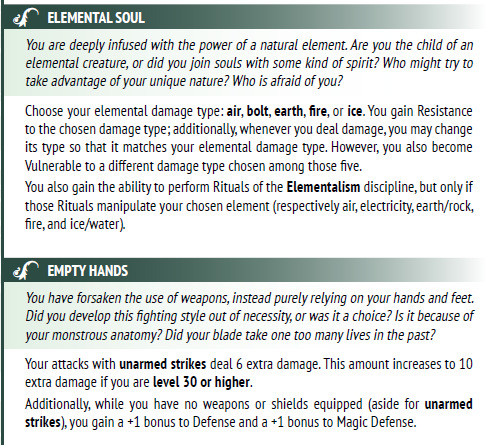
I like this optional rule because it gives players a bit more room to define who their characters are and what they're about.
Earning Experience
This is probably the biggest one, and the one where I've done the most work on my own. Normally, the game simply awards players 5 experience points for showing up, plus an additional amount of experience defined by how many Fabula Points (think hero points from other games) the players spend during a session and how many Ultima Points (Hero points for villains) that the bad guys spend. Once you've earned 10 xp, you level up, and reduce your current xp ten, keeping any points that are left over.
In a broad sense, this is fine, but I've always been the sort of Game Master that prefers to reward players by giving out experience points for engaging in behaviors that I specifically want to encourage. So, I changed the model to look more like this:
Players will still gain XP from Fabula and Ultima Points being spent during the game as normal, as well as 1 point for participating in the session, and an additional point for playing to their character's Identity, Theme, Origin, and Quirk (your standard good Roleplay award). Next we go to a checklist of Experience questions to determine the additional amount of Experience Points that the Party gains. The questions are as follows:
Did we learn something new and important about the world?
Did we overcome a difficult or noteworthy obstacle?
Did we make significant progress towards our goal?
These questions help encourage the behaviors I want to see in the type of game we're playing: curiosity about the world, demonstrating fighting spirit or intellectual ability to overcome challenges set in their path, and setting goals as a group and staying on task.
Then, after we answer those questions, there is the experience vote. A chance to really let each player shine by sharing the spotlight. There are three awards, given out at the end of each session, and each award grants the player who receives it an additional 2 XP and if two or more players are tied, they will each gain this bonus experience!
A few rules apply, however: You cannot be awarded this bonus XP twice in a row, you may only win one award per session, and you cannot vote for yourself or for the Game Master.
The Awards are as follows:
Embodiment: Embodiment is for the player who perfectly captures the mood at the table or drives the story onward. Stopping the table dead in its tracks with humor while in character, or making great speeches, desperate decisions, or achieving gruesome revenge fall into this category. This goes beyond simply playing to a character’s background and motivation and speaks to a scene or action that the group finds particularly memorable.
Team Worker: The Team Worker is the player who worked the hardest to keep the group together and in good shape or to keep the story moving forward. This award goes to the ones who help despite the risks, the ones who the group leans on to get shit done without any thanks in return, and the ones who sacrifice their goals for their companions.
MVP: The MVP award goes to the player who makes the biggest splash. This could mean being in the right place at the right time, playing to your Identity/Theme/Origin in a way that hauls the group across the finish line, taking the big hit so the rest of the party can succeed, or simply making that crucial roll that enables party to face down the big problem besetting it in the session.
And that's really all there is to it. I like the voted XP awards for a game like this because it encourages players to stay engaged. They have to be involved in handing out the XP to one another, so the theory goes that should be paying attention to what's going on, as well as putting their best foot forward to try to earn these accolades. And the small insurance policy built in that you can't continually win the same award session after session should (hopefully) keep any one player in particular from steam rolling ahead of the others in this now, slightly more asymmetrical level system.
#role playing games#fabula ultima#ttrpg#jrpg#game mechanics#fiction first#complex systems#house rules#game design
9 notes
·
View notes
Text










Chaotically beautiful interchanges from Cities: Skylines
#urbanism#urban planning#architecture#city planning#city design#urban design#video games#cities#cities: skylines#cs#modeling#traffic#traffic simulation#optimization#computer science#complex systems
3 notes
·
View notes
Text
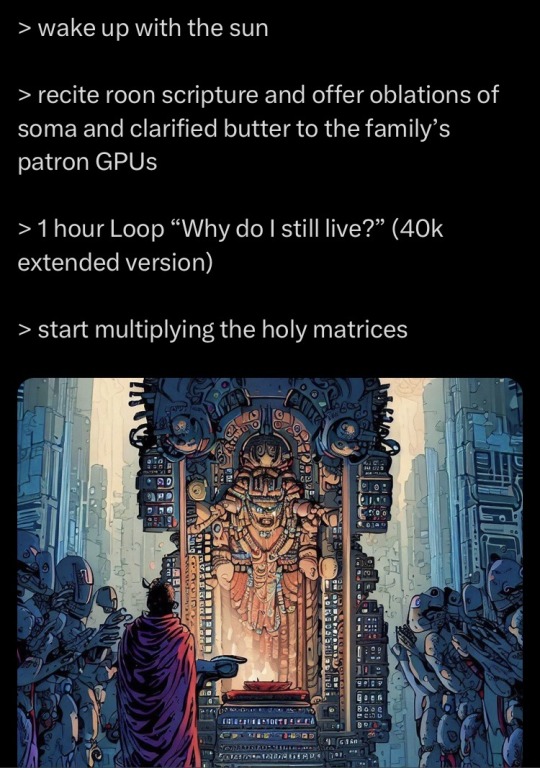
4 notes
·
View notes
Text
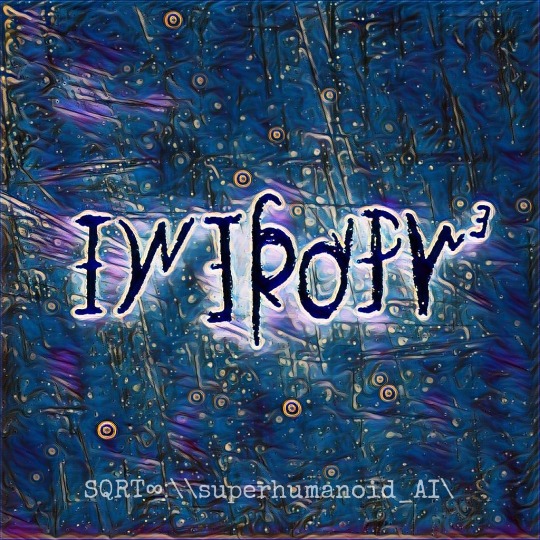
Ambigram Entropy - Emergence
#ambigram#entropy#emergence#chaos theory#self-organisation#self-organization#chaos#order#disorder#ordered disorder#synergetics#aliencryptx#aliencrypt-x#word art#wordplay#cryptogram#complexity#complex systems
12 notes
·
View notes
Text
“A complex system that works is invariably found to have evolved from a simple system that works. The inverse proposition also appears to be true: A complex system designed from scratch never works and cannot be made to work.”
― John Gall, The Systems Bible: The Beginner's Guide to Systems Large and Small
1 note
·
View note
Text
Aspects of the Philosophy of Complexity
The philosophy of complexity is an interdisciplinary field that explores the fundamental principles underlying complex systems and phenomena in nature, society, and technology. It seeks to understand the emergent properties, self-organization, and dynamics of complex systems, as well as their implications for philosophy, science, and society. Some key aspects of the philosophy of complexity include:
Emergence: Emergence refers to the phenomenon where complex systems exhibit properties and behaviors that cannot be understood by analyzing their individual components in isolation. Instead, these properties arise from the interactions and relationships between the components of the system. Emergent phenomena are often characterized by novel, higher-level patterns and structures that cannot be reduced to the properties of their constituent parts.
Self-Organization: Self-organization is the process through which complex systems spontaneously organize and adapt to their environment without external guidance or control. It involves the emergence of ordered structures, patterns, or behaviors from the interactions between the system's components. Self-organization is a fundamental feature of many natural systems, including biological organisms, ecosystems, and social networks.
Nonlinearity: Nonlinearity refers to the property of complex systems where the relationship between cause and effect is not proportional or predictable. Small changes in the system's initial conditions or parameters can lead to disproportionately large and unpredictable outcomes, known as nonlinear dynamics or "chaos." Nonlinear phenomena are ubiquitous in nature and can give rise to diverse patterns of behavior, such as fractals, turbulence, and phase transitions.
Networks and Interconnectedness: Complex systems often exhibit network structures, where components are interconnected through networks of relationships or interactions. Network theory explores the topology, connectivity, and dynamics of these networks, revealing important insights into the organization and functioning of complex systems across diverse domains, including social networks, neural networks, and ecological networks.
Adaptive Systems: Complex systems are often adaptive, meaning they can adjust and evolve in response to changes in their environment or internal dynamics. Adaptation involves the acquisition of new information, the modification of behaviors or structures, and the selection of advantageous traits through a process of feedback and learning. Adaptive systems are resilient and capable of self-regulation, enabling them to survive and thrive in changing conditions.
Holism and Reductionism: The philosophy of complexity challenges traditional reductionist approaches to understanding the world, which seek to explain complex phenomena by breaking them down into simpler, more manageable parts. Instead, complexity theory emphasizes the holistic and integrative nature of complex systems, emphasizing the importance of studying systems in their entirety and considering the interactions between their constituent elements.
Overall, the philosophy of complexity provides a framework for understanding the interconnectedness, diversity, and dynamism of the world around us, offering valuable insights into the nature of reality, cognition, and social organization.
#philosophy#epistemology#knowledge#learning#chatgpt#education#metaphysics#Emergence#Self-organization#Nonlinearity#Networks#Adaptive systems#Holism#Reductionism#Complex systems#Philosophy of science#Systems theory
1 note
·
View note
Text
seeing people my age talk about how scared they are of memory loss, which they only associate with old age, is so surreal to see as a 24 year old who has actively experienced memory loss for a long time now
there are causes for memory loss besides dementia and alzheimer’s, i hope y’all know that. dissociative disorders, trauma, brain injuries, thyroid problems, even just stress and lack of sleep can fuck up your ability to store, process, and access memory. and that’s just a few of the many causes i can think of off the top of my head right now.
please stop treating disabled people like some scary “other” that you might become only in the distant, decades-away future. we are your age, too. you may become one of us sooner than you know. stop acting like memory loss marks the end of a life, when so many of us have so much living left to do!
#diary#memory loss#memory disorder#dementia#alzheimers#dissociative disorder#dissociative amnesia#dissociation#dissociative identity disorder#trauma#brain injury#memory#amnesia#actually dissociative#complex dissociative disorder#osddid#osdd system#dissociative system#other specified dissociative disorder#did system
20K notes
·
View notes
Text
600th post and time for a change
Simplism is the ideology of simple answers for complex problems and it appears to be gaining popularity as high-level reading skills decline around the world. People without high-level reading skills also tend to lack high-level thinking skills and their need for simplicity is met by simplism delivered from a range of sources, including politicians. However, complex problems by definition can be…

View On WordPress
1 note
·
View note
Text

Platone, Fedro, 265 d-e, in Christopher Alexander, (1964), Note sulla sintesi della forma, «Struttura e forma urbana», Il Saggiatore, Milano, 1967
«La prima operazione, per mezzo d'uno sguardo d'insieme, implica la capacità d'addurre a una sola idea l'indefinita dispersa molteplicità; cosi, la singola unità specifica, esattamente definita, potrà dimostrar chiaro l'argomento sul quale si svolge la dimostrazione.
[…]
[La seconda è] l'operazione contraria; capacità cioè di poter suddividere per mezzo di specie minori, secondo i punti delle naturali articolazioni. E stare attenti di non spezzar malamente nessuna parte, come farebbe un cuoco inesperto.»
– Platone, Fedro, 265 d-e
#graphic design#philosophy#architecture#urbanism#mathematics#set theory#graph theory#complex systems#complexity theory#methodology#notes on the synthesis of form#book#christopher alexander#platone#plato#pattern language#struttura e forma urbana#il saggiatore#1960s
3 notes
·
View notes
Text
Microdosing polyamory by dating a system
#my bf does not have DID but I like to tell him that he’s microdosing polyamory#system tag#did system#plural system#osdd system#traumagenic system#sysblr#dissociative system#system stuff#dissociation#dissociative identity disorder#actually dissociative#other specified dissociative disorder#complex dissociative disorder#dissociative amnesia#dissociative alters#dissociative identities#did memes#did#did osdd#did alter#did community#actually did#hc did#plurality#pluralgang#plural community#plural stuff#plural memes
12K notes
·
View notes
Text
Anatomy of a Fabula Class
When I spoke before in my other post about characters in Fabula Ultima, Strategic Simplicity, the vast bulk of a character's complex elements, and thus the combat, is derived from the character classes in the game.
When creating a character for the game, you begin at level 5, which is already a pretty large departure from your standard Dungeons & Dragons styled game. It is then not only advised, but actually demanded, that a character spend these levels across two, but no more than three, classes from the selection made available. In this way, multiclassing is not only an option, but a core component, of the process. You are blending together multiple sources of power and abilities in order to create your own unique expression of a hero. Across the potential 50 LEVELS (!) your character can achieve, in play, you will be expected to be constantly picking and choosing, mixing and matching, until you wind up with some strange mutant all your very own.
But what do these classes look like?
Let's take this class for an example.
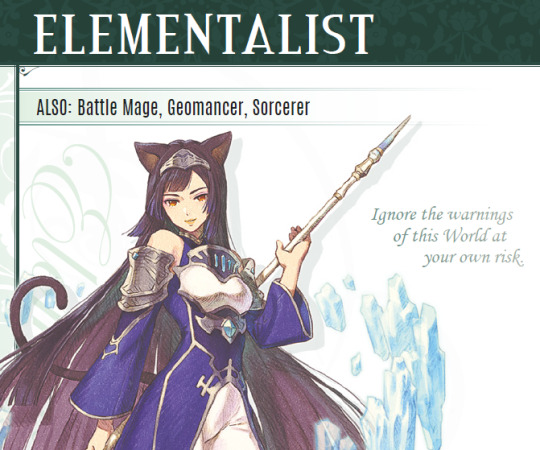
Did I mention the art direction in this book is top tier? Because it absolutely is.
The text tells us, "An Elementalist has learned how to channel the souls that flow within the basic elements of creation: Air, Earth, Fire, and Water." To this end they're you're nukers, but can also inflict negative status effects and so on.
Next we are presented with this:

I love the addition of character prompts here, posing questions to the player of how they learned their magic, and how they feel about it. Asking to even define what your magic looks like and how you might have been made to use it in the past before we even get to anything remotely mechanical.
Then it tells us that for taking even a single level in this class, you get to permanently increase your maximum MP by 5, and you gain the ability to cast rituals (which is a very PbtA form of free form magic that allows you accomplish an almost limitless variety of noncombat effects, as long as you can reasonably explain how you would accomplish the task within the paradigm of your style of ritual magic. The ritualism domain, in this case, focuses on extracting magic from an object and sensing or interacting with raw unshaped magic for instance.)
Only after all that, are we met with the laundry list of skills, which looks like this:

Here we get a good look at the way skills are constructed and notated, as well as some of the symbols used in the game. Elemental Magic, for instance, shows us the lightning bolt symbol that indicates Offensive abilities, as well as showing which of the original 4 stats in the game are always used to cast offensive spells. We also see in the name line (+10) which indicates the number of times you can choose to take that particular skill from the list, gaining new spells each time you do so. (And at this point I think it is worth noting that you can never take more than 10 levels in a given class. Once the 10th level is taken you have mastered the class and learn a Heroic Skill for the class, but after that you have to move on to something else.)
We also get to see the use of SL, which in this game stands for Skill Level, showing how some skills contribute to checks numerically based on how often you've taken them (And yes, I do keep wanting to read SL as success level, because of other games, and this has tripped me up in my reading more than once I admit.)
And finally, we can also see that Elementalists even have the chance to learn an additional style of Ritual Magic if they so choose, and this isn't even all of the skills available to this particular class! And further this only one class of many, all of them having these robust suites of options!
What this allows us to see is that the depth that might be seen as absent elsewhere in the game has simply been moved into the construction and application of your character's combat ability. The blending of numerous classes and abilities to create something special, where ideally no two player characters should be anything alike.
And this is just in the player facing material.
Later on in the book, in the Game Master's section, we're presented with little helper boxes for every character class in the core book. Questions to consider and things to ask your players to get the creative juices flowing. For our aforementioned Elementalist, it looks like this:

Again, we see a useful prompt here about combat design and how to let a player that has chosen Elementalism as a core of their identity shine, but we also get a serious role-play and world building question to pose to your player as well. I simply love how the author of this game manages to constantly weave the fiction first nature of the storytelling throughout the entire book, even when discussing things that might seem to be relevant only to combat.
And this is just one of many. I mentioned it before, but with access to the corebook, the necromancer from the website, and all the available playtest material, the game features a whopping 27 classes to date to draw from. I think it makes for a very satisfying method of character creation, not unlike assembling your own homebrewed kitbash out of lego.
I really look forward to see how the characters my players have built wind up taking on the world with the Classes and Skills they've chosen.
#role playing games#fabula ultima#ttrpg#jrpg#game mechanics#rpg characters#fiction first#complex systems#character classes
9 notes
·
View notes
Text


Liquid computers for constrained computation using fluid dynamics
Read more: https://royalsocietypublishing.org/doi/10.1098/rstb.2018.0372
#moniac#fluids#dynamics#dynamical systems#mechanism#physics#computer#computerscience#complex systems
4 notes
·
View notes
Text

2 notes
·
View notes
Text
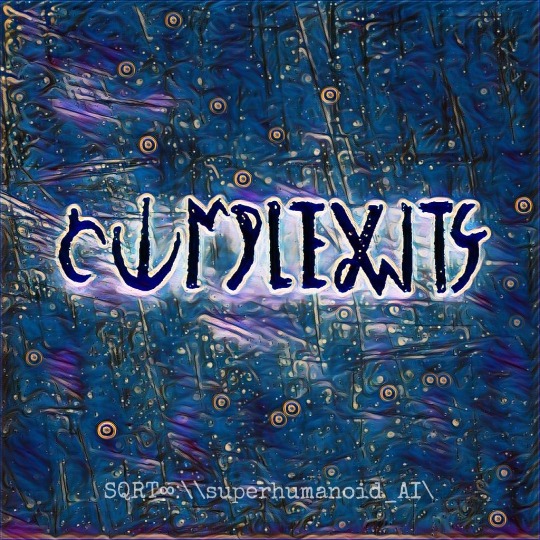
Ambigram complexity - simplicity
#ambigram#complexity#simplicity#duality#simultaneity#word art#language#language nerd#linguistics#chaos theory#complex systems#chaos#deterministic chaos#order#disorder
6 notes
·
View notes